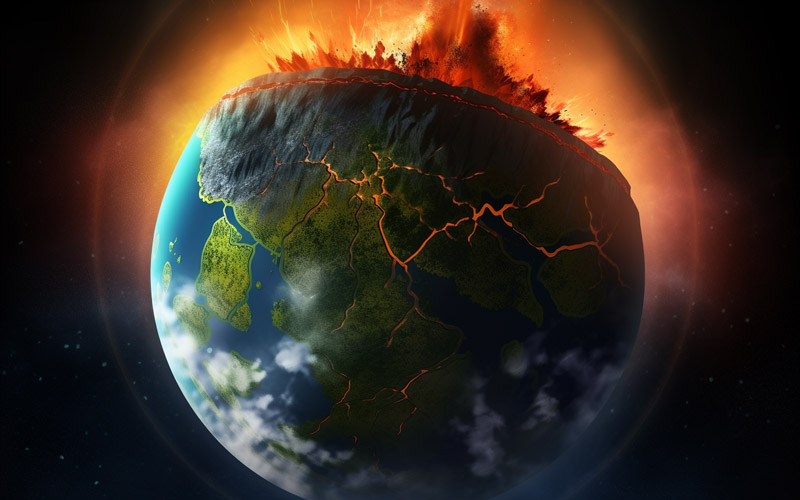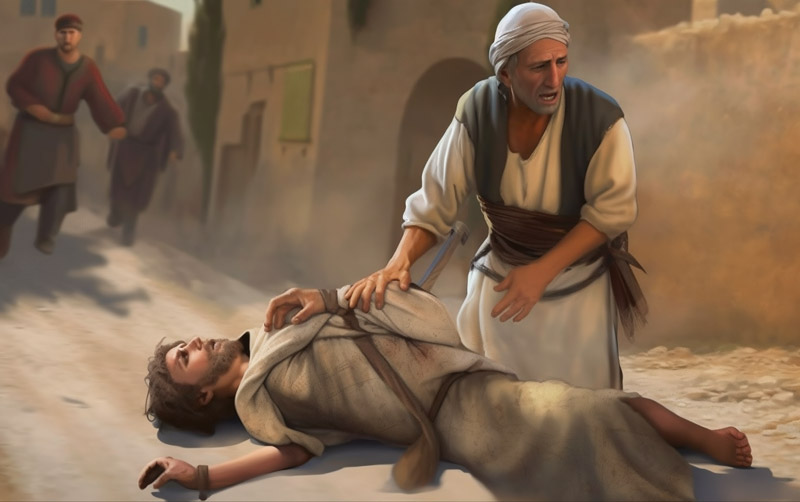The Bible and the Environment

The environment has always been an integral part of human existence, shaping our lives and providing us with the resources needed for survival. Throughout history, however, our relationship with the natural world has been marked by both care and destruction. In this article we will explore the Bible's perspective on the environment, the ways in which humanity has caused harm, and the responsibility we have to care for our planet. We will also look forward to a time when the world will be put right again, as described in the Bible's vision of a future kingdom.
The Bible and the Environment: A Sacred Relationship
The Bible is rich with passages that highlight the importance of the environment and the interconnectedness of all living things. From the very beginning, in the Genesis creation story, we see that God has designed the earth and its inhabitants to live in harmony. In Genesis 1:28, God gives humanity the responsibility to "fill the earth and subdue it" and to "rule over" the animals. This charge, often referred to as the "dominion mandate," has been interpreted in various ways over the centuries. Some see it as a call for environmental stewardship, while others have used it to justify exploitation of the earth's resources.
Another key biblical passage is Psalm 24:1, which states, "The earth is the Lord's, and everything in it, the world, and all who live in it." This verse reminds us that the environment is not our possession, but rather a sacred trust from God. As such, we have a responsibility to treat it with care and respect.
A History of Environmental Destruction
Throughout history, humanity's relationship with the environment has been marked by both care and destruction. As our population has grown and our needs have expanded, we have increasingly exploited the earth's resources, often with little thought for the consequences.
Deforestation, pollution, soil erosion, and loss of biodiversity are just a few examples of the environmental destruction that has occurred over the centuries. These actions have not only damaged the natural world but also threatened the well-being of countless human communities that depend on healthy ecosystems for their survival.
The Industrial Revolution, which began in the late 18th century, further exacerbated these problems. As societies shifted from agrarian to industrial models, the demand for resources skyrocketed, leading to even more significant levels of environmental degradation. This trend has continued into the present day, as our modern, technologically-driven society continues to consume resources at an alarming rate.
Our Responsibility to Care for the Environment Now
As we recognise the damage that has been done to the environment throughout history, it becomes increasingly clear that we have a responsibility to care for the earth and its resources. The Bible offers us guidance in this endeavour, reminding us of our sacred duty to protect and nurture the environment as stewards of God's creation.
One way we can do this is by adopting more sustainable practices in our daily lives. This might involve reducing our consumption of resources, supporting renewable energy, and working to minimise waste. On a broader level, we can advocate for policies that prioritise environmental protection and promote responsible resource management.
Another essential aspect of caring for the environment is recognising the interconnectedness of all living things. As we begin to see ourselves as part of a larger ecological community, we can develop a greater sense of empathy and compassion for the natural world and work to preserve the earth for future generations.
The Bible's Vision for a Restored Earth
As we grapple with the environmental challenges of today, the Bible offers a vision of hope for the future. In passages such as Isaiah 11:6-9 and Revelation 21:1-5, we find descriptions of a time when the world will be transformed, and harmony will be restored between humanity and the natural world.
In Isaiah 11:6-9, the prophet describes a future where predatory animals will live peacefully alongside their prey, and even young children will be safe in their presence. This passage paints a picture of a world in which violence and destruction have given way to peace and harmony, not only among humans but also within the natural world.
Revelation 21:1-5 provides a vision of a new heaven and a new earth, where God will dwell among his people and "wipe away every tear from their eyes." In this restored world, there will be no more death, mourning, or pain, and all of creation will be renewed.
These passages offer hope and inspiration for those who long for a world where the environment is respected, valued, and protected. They serve as a reminder that, even in the face of overwhelming challenges, we can work towards a brighter future for the earth and all its inhabitants.
The Role of the Kingdom in Restoring the Earth
The Bible's vision of a restored earth is closely tied to the concept of the kingdom of God. Throughout the Bible, the kingdom is described as both a present reality and a future hope. Jesus himself often spoke of the kingdom, urging his followers to seek it above all else (Matthew 6:33) and to live in a way that reflects its values.
The establishment of the kingdom on earth represents a time when God's will is done, and justice, peace, and righteousness prevail. In this context, the restoration of the environment can be seen as an integral part of the coming kingdom.
As Christians, we have a role to play in working towards this vision of a restored earth. By living in a way that reflects the values of the kingdom, we can contribute to the healing of our planet and the transformation of our world. This might involve caring for the environment through sustainable practices, advocating for policies that protect the earth, and working to promote peace and justice in our communities.
The Bible offers a rich and multifaceted perspective on the environment, calling us to be responsible stewards of the earth and its resources. Throughout history, humanity has often failed to live up to this responsibility, resulting in significant environmental destruction. However, we have the opportunity to change course and work towards a more sustainable and compassionate relationship with the natural world.
As we look to the Bible for guidance and inspiration, we can find hope in the vision of a restored earth, where harmony and peace reign. By embracing the values of the kingdom of God and working to protect and preserve the environment, we can contribute to the healing of our planet and the realization of this biblical vision for a better world.


